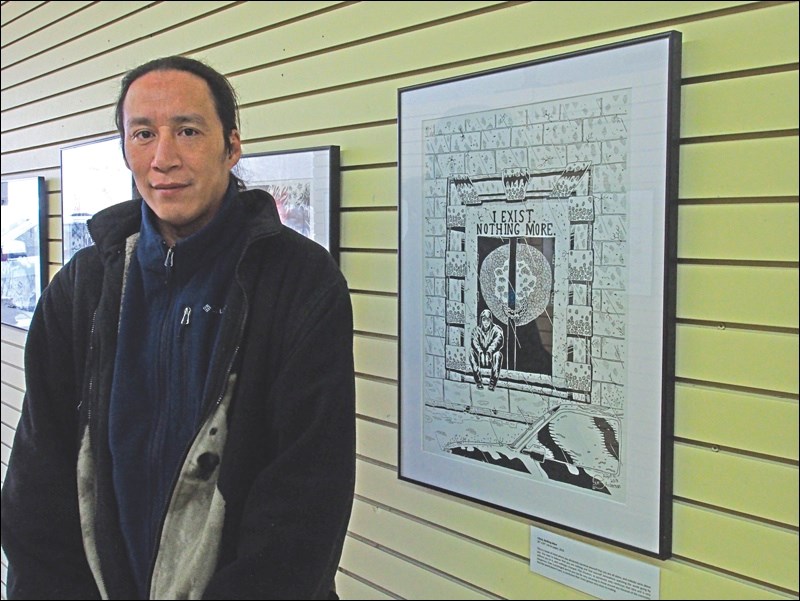Artistic expression can be a powerful tool for healing. For illustrator Kevin Anderson, it has been a crucial one.
Last week, Anderson visited Flin Flon to discuss Streetlife, his series of pen-and-ink drawings that is exhibited at the NorVA Centre this month. Through this collection Anderson examines, with heartbreaking honesty, the experience of homelessness.
If anyone is qualified to tackle the subject, it’s Anderson. He spent 10 years sleeping on the streets of Winnipeg, on friends’ couches “or wherever I passed out,” until he moved into a housing community and urban art centre called The Red Road Lodge, where he now lives.
Anderson’s drawings explore the isolation he felt during that time in his life, while also looking at some of the systemic issues that lead to homelessness, including domestic abuse and addictions.
“Everything is pretty much connected,” Anderson said.
Raised in Sioux Lookout ON, Anderson experienced abuse from a young age and moved to multiple foster homes during his childhood.
“My parents, they were raised in residential schools so what they learned – all this abuse – what they did is they amplified it on me,” he said.
“They took what they learned and made it even worse.”
For the young Anderson, art became “a way of coping, going into my own head.”
He also learned that he had an unusual talent: he recalls an early memory of being chastised for tracing a picture, when in fact the artwork was his own.
As he got older, Anderson began to suffer severe mental episodes that he describes as attacks, where he would feel overwhelmed by the burden of memories of the abuse he had suffered.
“For some reason, my head, it just doesn’t accept any of it, never did,” he said.
Now 41, Anderson says these attacks still plague him and can last hours, though retreating into his art often helps him to pull himself out of that mind state.
Living in The Red Road Lodge helps, too. Housed in a former hotel at the corner of Main Street and Logan Avenue in Winnipeg, the lodge offers a dry, safe community and private rooms for individuals in recovery from addictions or suffering from mental illness.
Residents can access life skills training, supportive staff and, significantly for Anderson, diverse arts and cultural programming.
“What people don’t really see is how creative people can be, even if they look all shabby and smell like booze,” Anderson said. “You’d be surprised at what they create.”
Anderson added that providing marginalized people with a chance to discover their own talents can go a long way in helping them stabilize their lives and find a sense of purpose.
“They have to find what they are actually really good at, I would say. Not everyone can draw or paint, but some might be able to do a different thing really well. That’s what the program [at Red Road Lodge] starts, anyway, because there are a variety of things you can do. They just invite them and see what they might like.”
While drawing is often therapeutic for Anderson, he said the creative process behind Streetlife was an emotional one, due to the nature of the content.
“It was kind of a rollercoaster. Sometimes I would get upset and put the pen down and go calm down somewhere, but I knew I had to draw.”
Streetlife is now touring around the province with support from the Manitoba Arts Council.
At the NorVA event, Anderson shared samples from his current project, a graphic novel in which he explores another challenge he is facing: fighting multiple myeloma, a blood cancer that affects plasma cells.
Anderson’s resilience in the face of abuse, mental illness, homelessness and now cancer is truly remarkable. When asked what helped him to get his life on track, Anderson credits the sense of community he has found as an adult.
“It’s people not giving up on me – as soon as I saw that, I thought, ‘Oh, I can do this,’” he said.




